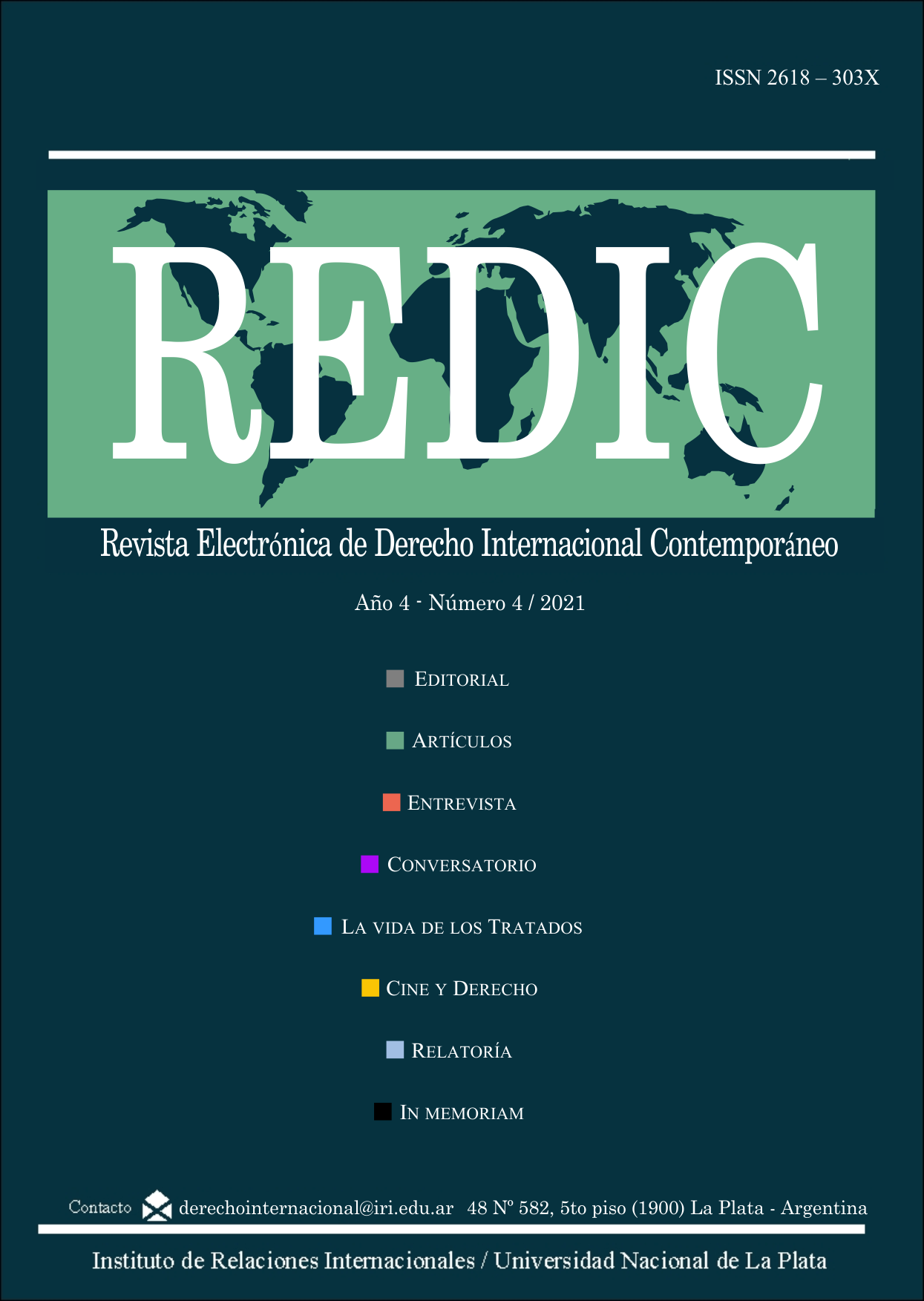Statehood as the holy grial of the geopolitical and legitimizing use of international law
Considerations from an actual case as interpreted by the cinema
DOI:
https://doi.org/10.24215/2618303Xe023Keywords:
subjects of international law, interaction with international law, law and literature, critical analysis of law, teaching of international lawAbstract
The film Rose Island (2020), based on the true history of this micro-State, is the starting point for a double pedagogical and critical exercise. We first study aspects related to the teaching of institutions and the basic pillars of international law, mostly - though not exclusively - regarding issues connected to subjectivity. Then, we look at how the analysis of the film also reveals historically and politically-charged realities and tensions that are inherent and even constitutive of international law. The “state-centrism” of international law is evident in the period in which the narrative takes place, and we can see that, even today, much of what concerns international institutions and their formation depends on the will of the subjects identified with the socially constructed collective entities we call States. In both analyses, we can see how statehood continues to be a very attractive figure, insofar as it constitutes the basis for privileges of action.
Downloads
References
Becker Lorca, A. (2014). Mestizo International Law. Cambridge University Press.
Becker, H. S. (2014). What About Mozart? What About Murder? Reasoning From Cases, University of Chicago Press.
Berman, H.(1983). Law and Revolution. Harvard University Press.
Bianchi, A. (2016). International Law Theories: An Inquiry into Different Ways of Thinking. Oxford University Press.
Borderline Jurisprudence podcast (2021). Episode 2: Ntina Tzouvala on Critique and International Law.
Boris, V. (2017). What Makes Storytelling So Effective For Learning? Leading the way: Ideas and insights from Harvard Business Publishing Corporate Learning (Blog).
Bruner, J. (1986). Actual minds, possible worlds, Harvard University Press.
Came, D. (2013). The Themes of Affirmation and Illusion in the Birth of Tragedy and Beyond. En John Richardson y Ken Gemes, The Oxford Handbook of Nietzsche (pp. 209-225). Oxford University Press.
Cançado Trindade, A. (2003). Voto concurrente a Corte IDH. Condición jurídica y derechos de los migrantes indocumentados. Opinión Consultiva OC-18/03 de 17 de septiembre de 2003. Serie A No. 18.
Carrillo Santarelli, N. (2018). A look into The Human Rights and Inter-State Abuses of Foreign Powers and Autocrats in García Márquez: An International Law and Literature Study. DPCE Online, Vol. 36, No. 3, 617-637.
Carrillo-Santarelli, N. y Olarte-Bacarés, C. (2019). From Swords to Words: the Intersection of Geopolitics and Law, and the Subtle Expansion of International Law in the Consolidation of the Independence of the Latin American Republics. Journal of the History of International Law, Vol. 21, 378-420.
Cortés Martín, J. M. (2008). Las organizaciones internacionales: codificación y desarrollo progresivo de su responsabilidad internacional. Instituto Andaluz de Administración Pública.
d’Aspremont, J. (2011). Non-state actors in international law: oscillating between concepts and dynamics. ACIL Research Papers, 1-21.
del Arenal, C.(2008). Mundialización, creciente interdependencia y globalización en las relaciones internacionales. Cursos de derecho internacional y relaciones internacionales de Vitoria-Gasteiz (pp. 181-268).
García Márquez, G. (2004). Memoria de mis putas tristes. Norma.
Gómez Robledo, A. (1989). Fundadores del derecho internacional: Vitoria, Gentili, Suárez, Grocio. Universidad Nacional Autónoma de México.
Gourgourinis, A. (2011). The Distinction Between Interpretation and Application of Norms in International Adjudication. Journal of International Dispute Settlement, Vol. 2, 31-57.
Grant, T. D. (2013). Micro States. En Max Planck Encyclopedias of International Law. Oxford University Press.
Kelsen, H. (2009). Teoría Pura del Derecho. Universidad de Buenos Aires.
Klabbers, J. (2013). International Law. Cambridge University Press.
Leigh, D. et al. (2016). The Movie Book: Big Ideas Simply Explained. DK.
Lustig, D. (2018). Governance Histories of International Law. En Markus D. Dubber y Christopher Tomlins, The Oxford Handbook of Legal History. Oxford University Press.
McDougal, M. S. et al. (1969). Human Rights and World Public Order: A Framework for Policy-Oriented Inquiry. American Journal of International Law, Vol. 63, 237-269.
McIntosh, S. (2020). Rose Island: Netflix adapts the story of ‘prince of anarchists’ Giorgio Rosa. BBC News.
Nijman, J. (2004). Leibniz’s Theory of Relative Sovereignty and International Legal Personality: Justice and Stability or the Last Great Defence of the Holy Roman Empire. IILJ Working Papers, 1-57.
Remiro Brotóns, A. et al. (2007). Derecho internacional. Tirant Lo Blanch.
Tolstoy, L. ¿Qué es el arte?
Tucídides. Historia de la Guerra del Peloponeso.
Additional Files
Published
How to Cite
Issue
Section
License
Aquellos autores/as que tengan publicaciones con esta revista, aceptan los términos siguientes:
- Los autores/as conservarán sus derechos de autor y garantizarán a la revista el derecho de primera publicación de su obra, el cuál estará simultáneamente sujeto a la Licencia de reconocimiento de Creative Commons (BY-NC-SA) 4.0 que permite a terceros compartir la obra siempre que se indique su autor y su primera publicación esta revista, no se haga uso comercial, y si se remezcla, se transforma o se crea a partir del material, se debe distribuir bajo la misma licencia del original.
- Los autores/as podrán adoptar otros acuerdos de licencia no exclusiva de distribución de la versión de la obra publicada (p. ej.: depositarla en un archivo telemático institucional o publicarla en un volumen monográfico) siempre que se indique la publicación inicial en esta revista.
- Se permite y recomienda a los autores/as difundir su obra a través de Internet (p. ej.: en archivos telemáticos institucionales o en su página web) antes y durante el proceso de envío, lo cual puede producir intercambios interesantes y aumentar las citas de la obra publicada. (Véase El efecto del acceso abierto).





















